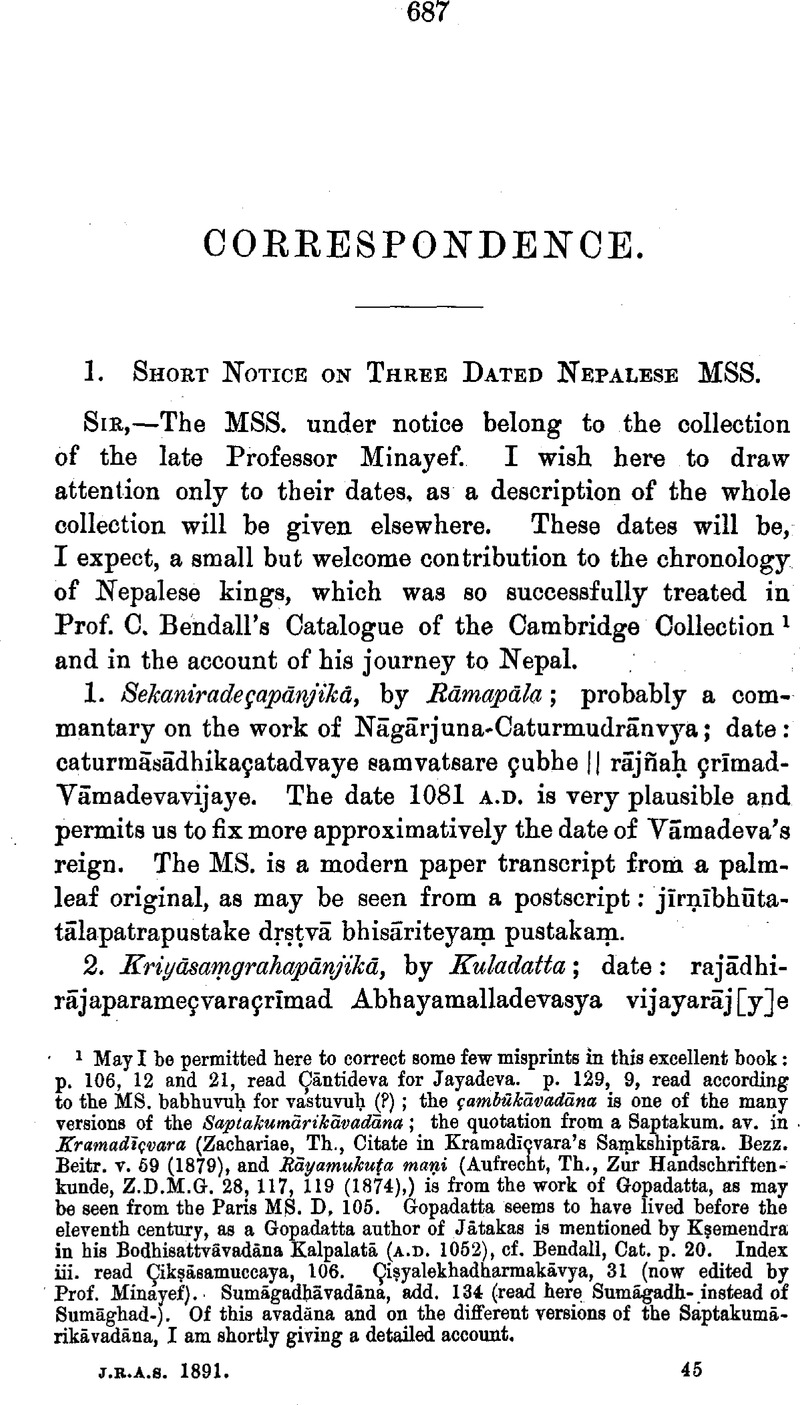No CrossRef data available.
Article contents
1. Short Notice on Three Dated Nepalese MSS
Published online by Cambridge University Press: 15 March 2011
Abstract

- Type
- Correspondence
- Information
- Copyright
- Copyright © The Royal Asiatic Society 1891
References
page 687 note 1 May I be permitted here to correct some few misprints in this excellent book: p. 106, 12 and 21, read Çāntideva for Jayadeva. p. 129, 9, read according to the MS. babhuvuḥ for vastuvuḥ (?); the çambūkāvadāna is one of the many versions of the Saptakumārikāvadāna; the quotation from a Saptakum. av. in Kramadīçvara (Zachariae, Th., Citate in Kramadīçvara's Saṃmkshiptāra. Bezz. Beitr. T. 69 (1879), and Rāyamukuṭa maṇi (Aufrecht, Th., Zur Handschriftenkunde, Z.D.M.G. 28, 117, 119 (1874),) is from the work of Gopadatta, as may be seen from the Paris MS. D, 105. Gopadatta seems to have lived before the eleventh century, as a Gopadatta author of Jātakas is mentioned by Kṣemendra in his Bodhisattvāvadāna Kalpalatā. (A.D. 1052), cf. Bendall, Cat. p. 20. Index iii. read Çikṣāsamuccaya, 106. Çiṣyalekhadharmakāvya, 31 (now edited by Prof. Minayef). Sumāgadhāvadāna, add. 134 (read here Sumāgadh-instead of Sumāghad-). Of this avadāna and on the different versions of the Saptakumārikāvadāna, I am shortly giving a detailed account.
page 688 note 1 I will give here only one instance of misrepresentation of the texts: Nep. Sanscr. Buddh. Lit. p. 300. XIX. Story of Srīmatī. King Bimbisāra had once given a handsome palace, named Jyotishka, to one of his sons, whereupon another, named Ajātasātru, etc. This is partly an account of the story of Jyotiṣka found in a somewhat different shape in the Divyāvadāna, in the Sumāgadhāvadāna, and probably in other avadānas. Jyotiṣka is the name of a man, and in the passage in question the text (sufficiently clear) runs as follows (we quote from the Paris MS. D. 124, fol. 1672):
“Yadā rājā mahīpālo Bimbisāro nṛpottamạḥ | Jyotiṣkāya dadau prītyā divyaçrīsaṃyutam gṛham tadaivājātaçatruḥ sa dṛṣtvairerṣyā samanvitaṣ | hā dhig mām iti niçvasya tasthau duḥkhārttamānasaḥ āḥ kathaṃ nāma tātasya mahārājasya me pituḥ | evaṃ vyānishitā buddhiḥ svatmaje pi sute mayi yat svaputraya me datvā sarvasādhāraḥaṃçriyam | sarvalokānubhūtām ca rājalakṣmīm nṛpaḥ pitā Jyotiṣkāyānyaputrāya duṣprāpyāṃ yāṃ surair api | pradadāti mahālakṣmīṃ divyaçriyaṃ pitā mama.”
We would doubt the reading Nandīçvarācārya, pp. 17 and 40, as the two Cambridge MSS., the London, and the Paris one, read something like than-, but clearly no n. On p. 57 we find curious bibliographical facts.


